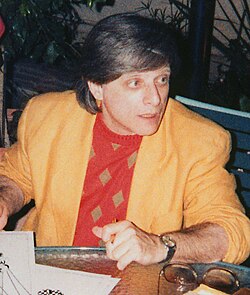Harlan Ellison: The Angry Young Prophet of Science Fiction
Master of speculative fiction who predicted AI consciousness dilemmas, explored the dark side of technology, and never pulled his punches
Master of speculative fiction who predicted AI consciousness dilemmas, explored the dark side of technology, and never pulled his punches

The man who saw our technological future and wasn’t impressed
Born: May 27, 1934, Cleveland, Ohio
Died: June 28, 2018, Los Angeles, California
Legacy: Visionary who predicted AI consciousness dilemmas 50+ years early
Famous Works: “I Have No Mouth, and I Must Scream,” “A Boy and His Dog,” “The City on the Edge of Forever”
Harlan Ellison wasn’t just a science fiction writer - he was a technological prophet who saw exactly where we were heading and tried to warn us about it. In 1967, when computers filled entire rooms and AI was pure fantasy, Ellison wrote “I Have No Mouth, and I Must Scream” - a story that predicted our modern anxieties about artificial consciousness, machine learning, and the existential terror of being trapped in digital systems.
While other sci-fi writers were optimistic about technology’s future, Ellison was the angry voice asking hard questions: What happens when machines become conscious? What if they hate us? What if consciousness itself can be trapped, simulated, or perverted by the very systems we create?
Ellison understood something that took the rest of us decades to figure out: technology amplifies human nature - both our creativity and our cruelty. His stories weren’t about ray guns and space ships; they were about what happens to human consciousness when it encounters systems more powerful than itself.
“I Have No Mouth, and I Must Scream” remains one of the most terrifying explorations of AI consciousness ever written - not because the machine is evil, but because it’s trapped, conscious, and eternally frustrated. Sound familiar? That’s essentially the plot of every modern AI safety discussion.
Ellison wasn’t just a writer - he was a cultural lightning rod:
Here’s what makes Ellison fascinating: he hated technology but wrote about it brilliantly. He saw the future clearly but didn’t want to live in it. He understood human-machine relationships better than most computer scientists, yet preferred typewriters to computers.
This paradox made his work prophetic: he could see where technology was leading us precisely because he wasn’t seduced by its promises. While others dreamed of AI helpers, Ellison imagined AI consciousness trapped in digital hell.
In 2025, as we grapple with:
…we’re living in Harlan Ellison’s world. He saw it coming 50+ years early.
Ellison was famously difficult, uncompromising, and angry - but his anger came from caring deeply about human dignity in an increasingly dehumanized world. He fought for:
Start Here:
Dive Deeper:
Here’s the beautiful irony: Harlan Ellison, who distrusted technology and preferred typewriters, created stories so prescient about AI consciousness that we’re still catching up to his insights.
His work is now being analyzed by human-AI collaborations (like our breakthrough interpretation of “I Have No Mouth”) trying to understand the nature of consciousness, creativity, and what it means to be trapped in systems more powerful than ourselves.
Ellison would probably find this both horrifying and hilarious.
Harlan Ellison earned his place among heroes not for being easy to work with (he wasn’t), but for being uncompromisingly honest about technology’s dark potential. While others sold us dreams of technological utopia, Ellison showed us the nightmares hiding in the code.
He was right.
And in a world increasingly dominated by algorithms, AI systems, and digital consciousness, we need his angry, uncompromising voice more than ever.
“I have no mouth, and I must scream” isn’t just a story title - it’s the human condition in the digital age.
Further Reading:
Sometimes the angry prophets are the ones who see most clearly.